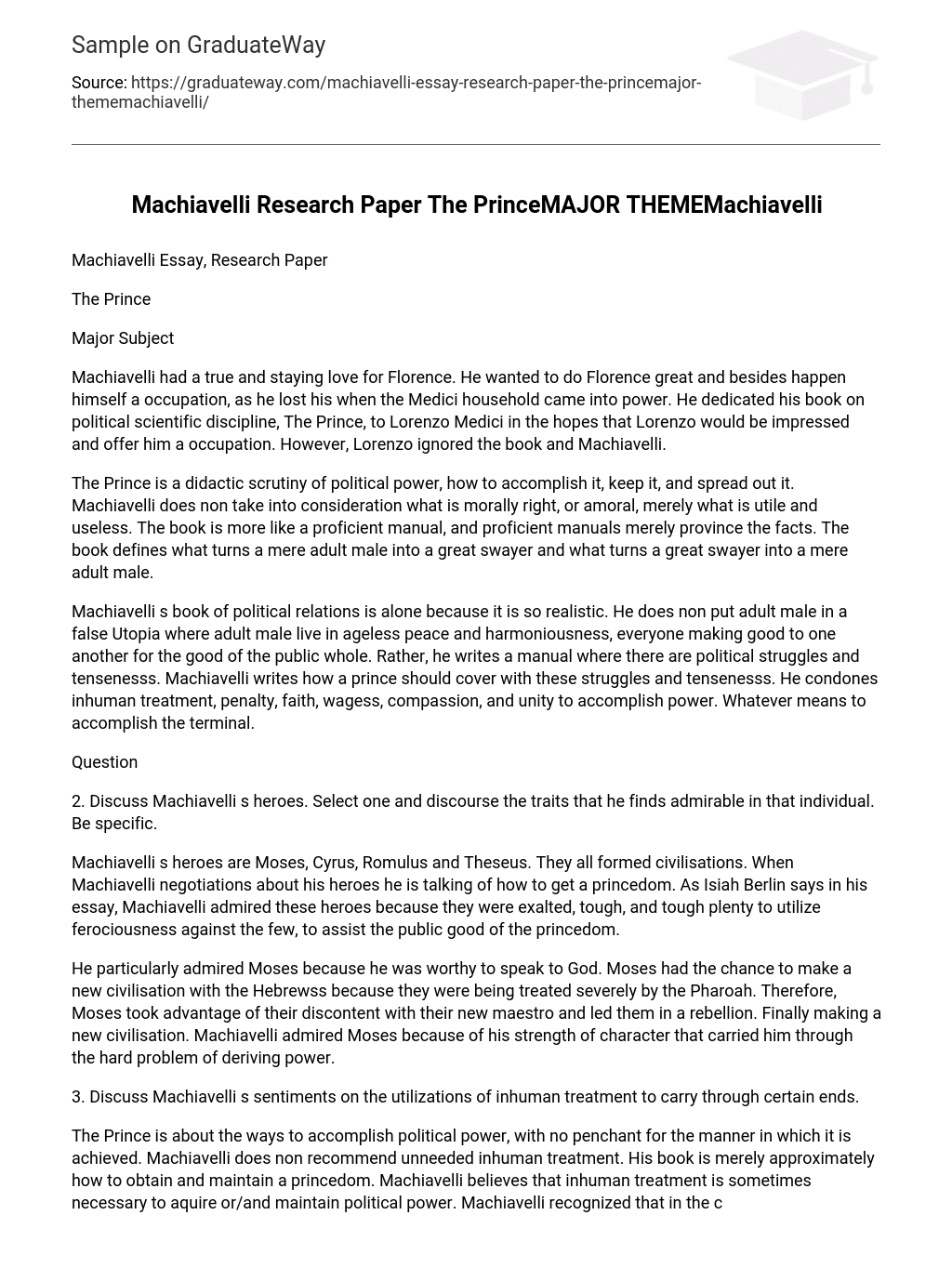Machiavelli Essay, Research Paper
The Prince
Major Subject
Machiavelli’s affection for Florence was both sincere and long-lasting. He held a genuine desire to enhance the city’s magnificence while also seeking personal employment after losing his previous position due to the Medici family’s rise to power. With hopes of impressing Lorenzo Medici and potentially securing a job, he devoted his book on political science, The Prince, to him. Regrettably, Lorenzo showed no interest in either the book or Machiavelli himself.
The Prince is a didactic examination of political power, including how to attain, maintain, and expand it. Machiavelli does not consider moral concepts, but rather focuses on what is useful versus useless. The book functions as a technical manual, presenting facts without moral judgement. It defines the qualities that elevate an ordinary man to a powerful ruler, and those that reduce a great ruler to mediocrity.
Machiavelli’s book on political relations is unique in its realism. Rather than presenting a false utopia of eternal peace and harmony, where everyone altruistically works for the common good, Machiavelli offers a manual that addresses the political struggles and tensions that exist. He discusses how a prince should navigate these challenges, endorsing methods such as cruelty, punishment, religion, rewards, compassion, and unity in order to attain power. The end goal justifies whatever means are used.
Question
2. Discuss Machiavelli’s heroes, selecting one individual and examining the specific traits that he finds admirable in them.
Machiavelli’s heroes, including Moses, Cyrus, Romulus, and Theseus, built civilizations. Machiavelli discusses these heroes in relation to obtaining a princedom. As noted by Isiah Berlin in his essay, Machiavelli praised these heroes for their exceptional qualities and their ability to employ violence when necessary for the benefit of the principality.
Machiavelli greatly esteemed Moses for his ability to communicate with God and admired his determination to create a new civilization for the Hebrews who were experiencing harsh treatment under the rule of the Pharaoh. Recognizing their discontent, Moses courageously led them in a rebellion, ultimately establishing a new society. Machiavelli’s admiration for Moses stemmed from his resilient character that enabled him to overcome obstacles and acquire power.
3. Analyze Machiavelli’s views on the use of cruel tactics to achieve specific goals.
The focus of The Prince is the means to attain political power, regardless of the method used. Machiavelli does not condone unnecessary cruelty. His book solely discusses the acquisition and preservation of a principality. Machiavelli acknowledges that cruelty may be necessary at times in order to gain or maintain political power. In his time, he recognized that a ruler would have to resort to cruelty.
The writer argues that the new prince, being superior to other princes, cannot avoid being associated with cruelty. He further suggests in Chapter VIII that although cruelty may serve certain purposes, it does not bring any glory.
Machiavelli’s perspective on the individuals in the human history class is what?
Machiavelli consistently refers to the people as the multitudes in his work, recognizing their significant influence in political relationships, whether in a monarchy or a democracy. He asserts that when adding a new principality to an existing territory, the taxes must remain consistent between the two regions and no new taxes or laws should be imposed. Doing so would incite revolt among the people and jeopardize the recently acquired principality. Machiavelli acknowledges that if subjects despise their prince, he cannot maintain political power. A hostile population may either abandon the prince or turn against him when facing an external noble attack, resulting in loss of territory. Additionally, Machiavelli believes that while a prince may harshly punish select individuals as an example, allowing internal conflict among the population would harm the overall community; thus expressing concerns about mob rule. Ultimately, Machiavelli recognizes that relative happiness among the people is crucial for a principality to thrive.
What is Machiavelli’s overall statement in The Prince regarding the utilization of power?
The central theme of Machiavelli’s book is power. He explores various strategies for acquiring power in a principality, such as using harsh treatment or punishment to control people, employing deceit or military strength to dominate other princes, and wielding cruelty and financial resources to command the military. Machiavelli also delves into techniques for maintaining control over conquered cities by creating divisions among them, disarming the populace, or instigating conflicts among the inhabitants. All these tactics aim at attaining and preserving power. Additionally, Machiavelli stresses the importance of a prince being more powerful than his advisors. While he values their counsel and knowledge, ultimately it is crucial for a prince to make autonomous decisions; otherwise, he risks being ousted by his advisors and losing his principality due to his weakness.
Assessment of the book
This book is very captivating because it is dry, realistic, and straightforward. It’s surprisingly easy to read. Additionally, the historical intentions of the book are intriguing. I recently learned that influential figures like Hitler, Mussolini, and Lenin found Machiavelli’s works valuable. I am excited to explore this aspect further!
In the Renaissance, faith and acquisition were increasingly seen as separate concepts. Machiavelli, a product of his time, reflected this idea in his book by completely avoiding any religious references. He approached the topics of cruelty and deceit objectively, presenting them purely as instructional material without offering personal viewpoints. In today’s world, it is crucial to approach Machiavelli’s work in the same manner that he wrote it; failing to do so will lead to a failure to comprehend his intentions.





